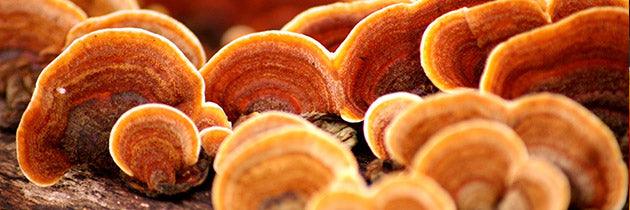QUICK FACTS
Scientific name: Ganoderma lucidum
Other names: Reishi, red reishi, ling zhi, mannentake, holy mushroom, ten-thousand-year mushroom, ambrosia polypore, mushroom of immortality
Location: Various species grow worldwide in tropical and temperate climates
Known for: Immune support and its glossy, red-brown appearance
Part Used: Fruiting body and mycelia
Fun fact: Reishi mushroom is usually kidney or broad fan-shaped, however, under certain growing conditions, it can grow in a slender branching manner that resembles the shape of antlers or sea coral.1
Good for: Immune health, liver support, stress management, cardiovascular health, kidney health
Key Properties & Actions: Adaptogen, anti-inflammatory, antioxidant, antibacterial, antiviral, antitumor, cardiotonic, hepatoprotective, renoprotective, immunomodulator
What is Reishi Mushroom?
Reishi mushroom is a prized medicinal mushroom; its medicinal properties have been coveted by humans for thousands of years. The species Ganoderma lucidum is the most popular, however, there are numerous reishi species that possess similar medicinal activity.
Typically dark reddish-brown in color with a glossy surface, this mushroom grows in a shelf-like position, normally on the base of hardwood trees, and can be seen on maples and hemlocks across the U.S. East Coast and throughout Europe, Asia, and even in the Amazon rainforest.
 The fruiting body, the aerial portion of the fungus known more commonly as a “mushroom,” is usually circular or fan-shaped with a corky texture when fresh. Classified in the fungal world as a polypore, the underside of the fruiting body has pores in place of the characteristic gills seen on many mushrooms. Reishi’s mushroom cap is generally 2-7 inches wide, although it can be larger.
The fruiting body, the aerial portion of the fungus known more commonly as a “mushroom,” is usually circular or fan-shaped with a corky texture when fresh. Classified in the fungal world as a polypore, the underside of the fruiting body has pores in place of the characteristic gills seen on many mushrooms. Reishi’s mushroom cap is generally 2-7 inches wide, although it can be larger.
Reishi has been utilized for its longevity and health-promoting qualities for thousands of years, earning nicknames like “elixir of life,” “mushroom of immortality,” and ”ten-thousand-year mushroom.” Many considered it a panacea, but it is especially admired for its immune-supportive, cardiovascular-supportive, liver-protective, and adaptogenic qualities.
Benefits of Reishi and How It Works
Immune Health
Reishi supports the immune system in a variety of ways:It contains a group of immune-balancing polysaccharide compounds, specifically beta-glucans, that can stimulate an increased immune response or turn down an overactive system by modulating inflammation.1,2,3,4
This is known as immunomodulating activity and can be helpful in protecting the body from infection, as well as supporting the immune system when conditions like allergies and autoimmunity are present.
Although human clinical trials are needed, reishi has shown potential value as an adjunct to cancer treatment. In vitro (in a test tube or dish) and in vivo (in a living organism) studies demonstrate reishi’s ability to stop the cycle of certain tumor cells, stimulate natural killer (NK) cells, and induce apoptosis, also known as programmed cell death.5,6
In a 2014 animal study, a 4-week administration of reishi extract suppressed breast-to-lung metastasis by downregulating genes responsible for cell invasion.7
Beyond its polysaccharides, reishi also contains triterpenoids, biologically active compounds with antiviral capabilities.3,4
Cardiovascular Support
In vitro and in vivo studies have demonstrated reishi’s antioxidant, hypoglycemic, hypotensive, and anti-inflammatory activity, which could be of benefit to the cardiovascular system. Alongside a healthy diet and lifestyle, these effects can discourage atherosclerosis, the buildup of plaque in the arteries, and correlated chronic diseases.1,8
Although more clinical trials are needed, recent studies have shown positive effects on the cardiovascular system. For example, a 2020 randomized, closed-label clinical trial administered reishi polysaccharides to atrial fibrillation patients for 90 days. At the end of the trial, reishi-treated subjects had a significant reduction in blood pressure, heart rate, and inflammatory markers compared to the control group.9

Liver Protection
Polysaccharides and triterpenoids, two compounds found in reishi mushroom, help to protect the liver by inhibiting free radical damage, elevating beneficial antioxidant enzyme activity, reducing damaging inflammatory responses, and various other mechanisms.4,10,11
Many in vitro and in vivo studies have confirmed the hepatoprotective effects of reishi against a wide range of liver diseases.
A 2018 animal study found a reishi extract to improve non-alcoholic fatty liver disease by inhibiting fatty acid synthesis.12 Another in vivo study showed reishi extract to reduce acute liver fibrosis induced by a hepatotoxin.13
Kidney Health
Similar to its liver protective mechanisms, reishi can improve kidney conditions through its ability to scavenge free radicals and reduce cellular damage.14
In vivo reishi studies have shown promise in supporting kidney deterioration due to diabetes. A 2014 animal study isolated a protein from the fruiting body of reishi to investigate its effects on kidney function in relation to diabetic nephropathy. The researchers concluded that the protein offered protection to the kidneys and could be beneficial for cases of diabetic nephropathy.15
Adaptogenic Qualities and Stress Support
Reishi mushroom is a calming adaptogen that can improve adrenal function and help the body adapt to a variety of stressors. This effect is best felt with consistent, long-term use.1,16
Like many adaptogens, reishi is also supportive of the nervous system and particularly useful for reducing stress-related symptoms like nervousness and poor sleep.1
History & Traditional Use
Reverence for reishi and its medicinal virtues were first recorded during the Qin dynasty in China (221-206 BC). Its description in a well-respected Chinese pharmacopeia, Shen Nong Ben Cao Jing, piqued the interest of emperors who enlisted thousands of laborers to search for this “fungus of immortality”.1,4 Shortly after, reishi’s image began appearing in artwork, furniture, carvings, and women’s accessories.
In traditional Chinese medicine, reishi is thought to replenish Qi, the vital life energy that flows through us. For those who could obtain the precious mushroom, it was used to increase stamina and cognitive function, improve musculoskeletal pain, and support the respiratory system.
The Chinese name ling zhi can be translated many different ways but loosely means “spiritual potency,” which is a reflection of reishi’s ability to soothe the spirit, being especially helpful in cases of insomnia and nervousness.
How to Use and Dosing
The fruiting body of reishi is commonly consumed as a powder or tea. Although the mushroom can be ground into a powder as is, the addition of an extraction process increases the mushroom’s benefits.
Look for a powdered extract that has gone through a water and alcohol extraction to ensure a full range of active compounds are available.
Additionally, choose an extract standardized to at least 4% beta-glucans. Generally, 200-400 mg can be taken 1-3 times daily.
 To prepare a reishi mushroom tea, combine 1 oz. of reishi with 32 oz. of water. Bring to a boil, then simmer for 1 to 2 hours. Strain and drink one cup up to three times daily. Reishi can be bitter, so it’s commonly combined with other herbs like ginger, cinnamon, and cacao.
To prepare a reishi mushroom tea, combine 1 oz. of reishi with 32 oz. of water. Bring to a boil, then simmer for 1 to 2 hours. Strain and drink one cup up to three times daily. Reishi can be bitter, so it’s commonly combined with other herbs like ginger, cinnamon, and cacao.
For immune health, reishi works well with herbs like andrographis, ashwagandha, astragalus, rhodiola, turmeric, cat’s claw, cordyceps, shilajit, Chinese skullcap, rehmannia, and Japanese knotweed.
For added anti-inflammatory and antioxidant activity, reishi can be combined with herbs like turmeric, gotu kola, boswellia, milk thistle, bacopa, and ginger.
Interactions
Use cautiously with blood thinning medications.
Always check with your health care practitioner before use if you are taking medications. For more general education on potential interactions between herbs and medications, check out Dr. Bill Rawls’ article: Is it Safe to Take Herbs with My Medications?
Precautions & Side effects
Reishi has thousands of years of use and is generally well tolerated. Side effects are rare but can include dry mouth, upset stomach, and rashes. Avoid use if you are allergic to mushrooms. If pregnant, consult your health care practitioner regarding the use of reishi mushroom.
Disclaimer: This information is intended only as general education and should not be substituted for professional medical advice. Any mentioned general dosage options, safety notices, or possible interactions with prescription drugs are for educational purposes only and must be considered in the context of each individual’s health situation and the quality and potency of the product being used. Use this information only as a reference in conjunction with the guidance of a qualified healthcare practitioner.
Want to See the Science? Check Out Our References Below.
1. Christa S. In: The Essential Guide to Western Botanical Medicine. Arcata, CA: Christa Sinadinos; 2020:429-434.
2. Han B, Baruah K, Cox E, Vanrompay D, Bossier P. Structure-Functional Activity Relationship of β-Glucans From the Perspective of Immunomodulation: A Mini-Review. Front Immunol. 2020;11. doi:10.3389/fimmu.2020.00658
3. Wachtel-Galor S, Yuen J, Buswell JA, Benzie IFF. Ganoderma lucidum (Lingzhi or Reishi): A Medicinal Mushroom. In: Benzie IFF, Wachtel-Galor S, eds. Herbal Medicine: Biomolecular and Clinical Aspects. 2nd ed. Boca Raton (FL): CRC Press/Taylor & Francis; 2011.
4. El Sheikha AF. Nutritional Profile and Health Benefits of Ganoderma lucidum “Lingzhi, Reishi, or Mannentake” as Functional Foods: Current Scenario and Future Perspectives. Foods. 2022;11(7):1030. Published 2022 Apr 1. doi:10.3390/foods11071030
5. Unlu A, Nayir E, Kirca O, Ozdogan M. Ganoderma Lucidum (Reishi Mushroom) and cancer. J BUON. 2016;21(4):792-798.
6. Hong KJ, Dunn DM, Shen CL, Pence BC. Effects of Ganoderma lucidum on apoptotic and anti-inflammatory function in HT-29 human colonic carcinoma cells. Phytother Res. 2004;18(9):768-770. doi:10.1002/ptr.1495
7. Loganathan J, Jiang J, Smith A et al. The mushroom Ganoderma lucidum suppresses breast-to-lung cancer metastasis through the inhibition of pro-invasive genes. Int J Oncol. 2014;44(6):2009-2015. doi:10.3892/ijo.2014.2375
8. Chan SW, Tomlinson B, Chan P, Lam CWK. The beneficial effects of Ganoderma lucidum on cardiovascular and metabolic disease risk. Pharm Biol. 2021;59(1):1161-1171. doi:10.1080/13880209.2021.1969413
9. Rizal A, Sandra F, Fadlan M, Sargowo D. Ganoderma lucidum Polysaccharide Peptide Reduce Inflammation and Oxidative Stress in Patient with Atrial Fibrillation. The Indonesian Biomedical Journal. 2020;12(4):384-389. doi:10.18585/inabj.v12i4.1244
10. Qiu Z, Zhong D, Yang B. Preventive and Therapeutic Effect of Ganoderma (Lingzhi) on Liver Injury. Adv Exp Med Biol. 2019:217-242. doi:10.1007/978-981-32-9421-9_9
11. Soares AA, de Sá-Nakanishi AB, Bracht A, et al. Hepatoprotective effects of mushrooms. Molecules. 2013;18(7):7609-7630. Published 2013 Jul 1. doi:10.3390/molecules18077609
12. Zhong D, Xie Z, Huang B, et al. Ganoderma Lucidum Polysaccharide Peptide Alleviates Hepatoteatosis via Modulating Bile Acid Metabolism Dependent on FXR-SHP/FGF. Cell Physiol Biochem. 2018;49(3):1163-1179. doi:10.1159/000493297
13. Lin WC, Lin WL. Ameliorative effect of Ganoderma lucidum on carbon tetrachloride-induced liver fibrosis in rats. World J Gastroenterol. 2006;12(2):265-270. doi:10.3748/wjg.v12.i2.265
14. Geng X, Zhong D, Su L, Yang B. Preventive and Therapeutic Effect of Ganoderma (Lingzhi) on Renal Diseases and Clinical Applications. Adv Exp Med Biol. 2019:243-262. doi:10.1007/978-981-32-9421-9_10
15. Pan D, Zhang D, Wu J, et al. A novel proteoglycan from Ganoderma lucidum fruiting bodies protects kidney function and ameliorates diabetic nephropathy via its antioxidant activity in C57BL/6 db/db mice. Food Chem Toxicol. 2014;63:111-118. doi:10.1016/j.fct.2013.10.046
16. Winston, D. and Maimes, S., 2007. Adaptogens: Herbs for Strength, Stamina, and Stress Relief. Rochester: Healing Arts Press.
17. Bhardwaj N, Katyal P, Sharma A. Suppression of Inflammatory and Allergic Responses by Pharmacologically Potent Fungus Ganoderma lucidum. Recent Patents on Inflammation & Allergy Drug Discovery. 2014;8(2):104-117. doi:10.2174/1872213×08666140619110657
18. Cör D, Knez Ž, Knez Hrnčič M. Antitumour, Antimicrobial, Antioxidant and Antiacetylcholinesterase Effect of Ganoderma Lucidum Terpenoids and Polysaccharides: A Review. Molecules. 2018;23(3):649. Published 2018 Mar 13. doi:10.3390/molecules23030649




